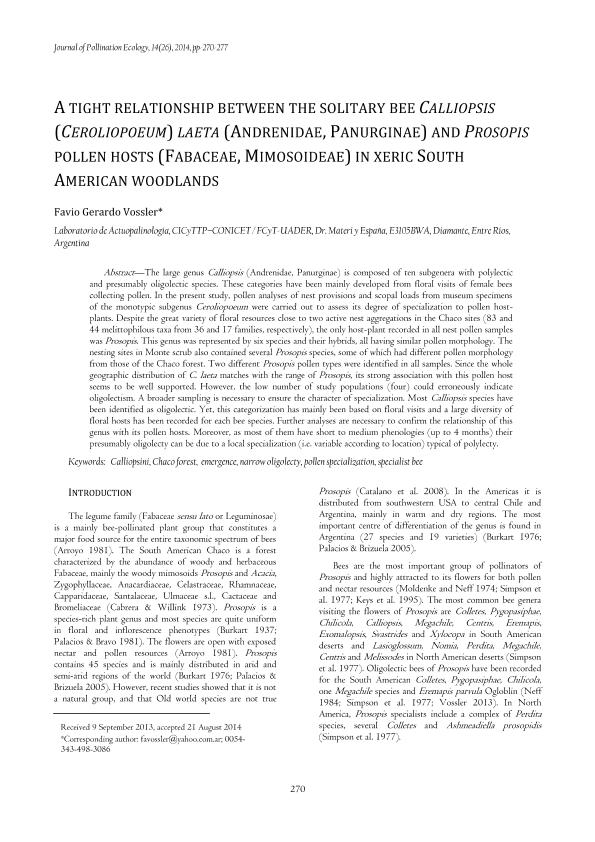Mostrar el registro sencillo del ítem
dc.contributor.author
Vossler, Favio Gerardo

dc.date.available
2017-06-26T20:35:40Z
dc.date.issued
2014-10
dc.identifier.citation
Vossler, Favio Gerardo; A tight relationship between the solitary bee Calliopsis (Ceroliopoeum) laeta (Andrenidae, Panurginae) and Prosopis pollen hosts (Fabaceae, Mimosoideae) in xeric South American woodlands; Enviroquest; Journal of Pollination Ecology; 14; 26; 10-2014; 270-277
dc.identifier.issn
1920-7603
dc.identifier.uri
http://hdl.handle.net/11336/18923
dc.description.abstract
The large genus Calliopsis (Andrenidae, Panurginae) is composed of ten subgenera with polylectic and presumably oligolectic species. These categories have been mainly developed from floral visits of female bees collecting pollen. In the present study, pollen analyses of nest provisions and scopal loads from museum specimens of the monotypic subgenus Ceroliopoeum were carried out to assess its degree of specialization to pollen host-plants. Despite the great variability of floral resources close to two active nest aggregations in the Chaco sites (83 and 44 melittophilous taxa from 36 and 17 families, respectively), the only host-plant recorded in all nest pollen samples was Prosopis. This genus was represented by six species and their hybrids, all having similar pollen morphology. The nesting sites in Monte scrub also contained several Prosopis species, some of which had different pollen morphology from those of the Chaco forest. Two different Prosopis pollen types were identified in all samples. Since the whole geographic distribution of C. laeta matches with the range of Prosopis, its strong association with this pollen host seems to be well supported. However, the low number of study populations (four) could erroneously indicate oligolectism. A broader sampling is necessary to ensure the character of specialization. Most Calliopsis species have been identified as oligolectic. Yet, this categorization has mainly been based on floral visits and a large diversity of floral hosts has been recorded for each bee species. Further analyses are necessary to confirm the relationship of this genus with its pollen hosts. Moreover, as most of them have short to medium phenologies (up to 4 months) their presumably oligolecty can be due to a local specialization (i.e. variable according to location) typical of polylecty.
dc.format
application/pdf
dc.language.iso
eng
dc.publisher
Enviroquest
dc.rights
info:eu-repo/semantics/openAccess
dc.rights.uri
https://creativecommons.org/licenses/by/2.5/ar/
dc.subject
Calliopsini
dc.subject
Chaco Forest
dc.subject
Emergence
dc.subject
Narrow Oligolecty
dc.subject
Pollen Specialization
dc.subject
Specialist Bee
dc.subject.classification
Ciencias de las Plantas, Botánica

dc.subject.classification
Ciencias Biológicas

dc.subject.classification
CIENCIAS NATURALES Y EXACTAS

dc.subject.classification
Ecología

dc.subject.classification
Ciencias Biológicas

dc.subject.classification
CIENCIAS NATURALES Y EXACTAS

dc.title
A tight relationship between the solitary bee Calliopsis (Ceroliopoeum) laeta (Andrenidae, Panurginae) and Prosopis pollen hosts (Fabaceae, Mimosoideae) in xeric South American woodlands
dc.type
info:eu-repo/semantics/article
dc.type
info:ar-repo/semantics/artículo
dc.type
info:eu-repo/semantics/publishedVersion
dc.date.updated
2017-06-23T18:13:37Z
dc.journal.volume
14
dc.journal.number
26
dc.journal.pagination
270-277
dc.journal.pais
Canadá

dc.journal.ciudad
Cambridge
dc.description.fil
Fil: Vossler, Favio Gerardo. Provincia de Entre Ríos. Centro de Investigaciones Científicas y Transferencia de Tecnología a la Producción. Universidad Autónoma de Entre Ríos. Centro de Investigaciones Científicas y Transferencia de Tecnología a la Producción. Consejo Nacional de Investigaciones Científicas y Técnicas. Centro Científico Tecnológico Conicet - Santa Fe. Centro de Investigaciones Científicas y Transferencia de Tecnología a la Producción; Argentina. Universidad Autónoma de Entre Ríos. Facultad de Ciencia y Tecnología; Argentina
dc.journal.title
Journal of Pollination Ecology
dc.relation.alternativeid
info:eu-repo/semantics/altIdentifier/url/http://www.pollinationecology.org/index.php?journal=jpe&page=article&op=view&path%5B%5D=280
Archivos asociados
